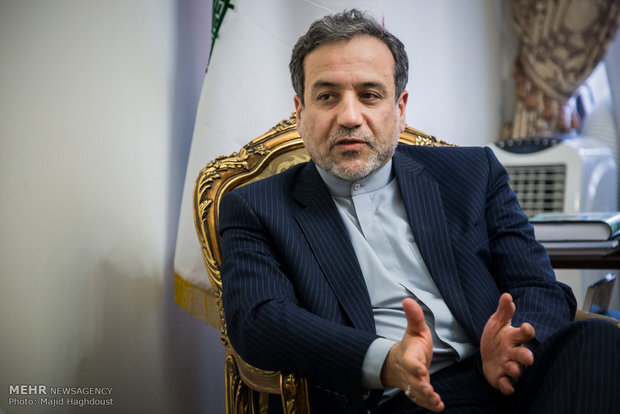Nuclear deal savable if remaining signatories act willfully: Araghchi

TEHRAN - Iranian Deputy Foreign Minister Abbas Araghchi said on Tuesday the Joint Comprehensive Plan of Action (JCPOA), commonly called the nuclear deal, can be preserved if the remaining signatories show enough determination.
Araghchi told reporters on the sidelines of the Tehran Dialogue Forum that the fifth step in modifying JCPOA undertakings was the final step and there won’t be any other step to take.
“There is still the possibility of preserving the JCPOA provided that the other side shows will,” the senior negotiator said.
Under the 2015 nuclear deal, Iran agreed to put limits on its nuclear activities in exchange for the termination of economic and financial sanctions. However, in May 2018 the Trump administration abrogated the agreement and started introducing the harshest ever sanctions on Iran. The remaining signatories, especially Europeans, have also failed to take a concrete step to shield Iran from sanctions.
Pointing to the Europeans’ threat to resort to trigger mechanism, Araghchi said, “It is natural that such issues will create a situation for faster end of the JCPOA.”
Late on Sunday, Iran took the fifth and last step to fully end commitment to the nuclear pact, the government announced in a statement.
According to the new step, from now on Iran will no longer commit to any limits on the level of uranium enrichment, the stockpile of nuclear fuel and related research and development, the statement said.
On Sunday, Foreign Minister Mohammad Javad Zarif announced via his official Twitter account that Iran was resolved to continue full cooperation with the International Atomic Energy Agency (IAEA) even after taking the fifth and final step to put an end to its obligations under the 2015 nuclear pact.
“Iran's full cooperation w/IAEA will continue,” Zarif tweeted.
According to the last step, Zarif said, Iran will see no “restriction on a number of centrifuges” that it can operate.
The chief diplomat reiterated the move is in accordance with paragraph 36 of the JCPOA.
“As 5th & final REMEDIAL step under paragraph 36 of JCPOA, there will no longer be any restriction on the number of centrifuges,” Zarif tweeted.
The chief diplomat reiterated Tehran’s long-held position that if the remaining parties to the JCPOA take steps to offset sanctions on Iran, Tehran will reverse its decisions.
“This step is within JCPOA & all 5 steps are reversible upon EFFECTIVE implementation of reciprocal obligations,” Zarif added.
Since May 8, Iran has been reducing its nuclear commitments with a series of steps every 60 days. In November, it gave Britain, France, and Germany a third 60-day deadline to salvage the Joint Comprehensive Plan of Action (JCPOA) or face a further decrease of commitments by Tehran. The deadline passed on Saturday.
On May 8, exactly one year after the U.S. abandoned the deal, Tehran said its “strategic patience” is over and began to partially reduce its commitments to the agreement at bi-monthly intervals.
In the first stage, Iran announced that it will not limit its stockpile of the nuclear fuel to 300 kilograms allowed under the deal. On that date (May 8) Iran’s Supreme National Security Council (SNSC) said if the remaining parties to the JCPOA, especially Europeans, devise a mechanism to protect Iran from the sanctions’ effect in the two-month deadline it will reverse its decision.
But since European parties missed the deadline, on July 7 Iran announced that it has started enriching uranium to a higher purity than the 3.67%, thereby starting the second step.
Again, as Europe missed the second 60-day deadline, Iran moved to take the third step, removing a ban on nuclear research and development (R&D).
MJ/PA
Leave a Comment